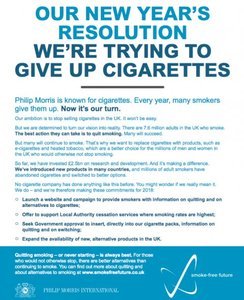Towards the end of December each year many smokers announce a New Year’s resolution: to give up smoking. Or they might say they resolve to give up cigarettes. What they don’t say, or if they did it would be meaningless, is that their New Year’s resolution is to try to give up smoking or cigarettes.
Smokers often say, if they’re asked whether they smoke, that they’re trying to give up. So that’s all right then? Well, it isn’t all right. It means they’re failing to give up.
The Oxford English Dictionary defines ‘resolution’ as firmness or steadfastness of purpose. Keeping this in mind, let’s turn to the shameful advertisement that Philip Morris International (PMI) placed in three UK newspapers at the beginning of January 2018. It’s reproduced at the top of this post. Note the headline: OUR NEW YEAR’S RESOLUTION[:] WE’RE TRYING TO GIVE UP CIGARETTES.
What this appears to mean is that they intend, at some unspecified time in the fairly distant future, presumably depending upon whether their profits from non-combustible tobacco products come to equal or exceed those of their cancer sticks, that they’ll try to stop making the latter. Give them a big hand!
Isn’t this a bit disingenuous, or isn’t it?
To try to answer the conundrum, let’s see what the CEO of PMI, Mr André Calantzopoulos, says in their Sustainability Report of 2016:
There is no doubt that the greatest contribution PMI can make to society is to replace cigarettes with less harmful alternatives.
Why is PMI’s greatest contribution to society merely to replace harmful cigarettes with something that’s also harmful, even if less so, rather than forthwith stop making cigarettes altogether?
And how good of him to give us advice:
Smoking cigarettes causes serious disease, and the best way to avoid the harms of smoking is never to start, or to quit.
If PMI really wanted to make a contribution to society (don’t laugh), why don’t they stop making cigarettes tomorrow? Mr Calantzopoulos has an answer to that, but it’s hollow:
We have developed a range of smoke-free products that are enjoyable for smokers and have the potential to significantly reduce health risks when compared to smoking.
So, he would have us believe that smokers smoke for enjoyment, would he? This is where the whole argument falls down. Smokers do not enjoy smoking. The idea that they do is the biggest confidence trick in the history of the world. The only reason smokers smoke is because of their perceived inability to quit. Why this is so is explained in my book, Stop Smoking: Real Help a Last.
Back to Mr Calantzopoulos:
I am frequently asked when we will stop selling cigarettes. Our objective is to reach this moment as soon as possible…Whether or not PMI alone stops selling cigarettes is in any case irrelevant from a public health perspective. As long as there is smoker demand for cigarettes there will be supply.
It’s hardly irrelevant whether PMI alone stops selling cigarettes. That would only be a start, but considering the stature of PMI it would be a very significant start towards the worldwide abolition of combustible tobacco products.
Why is there such a demand for cigarettes anyway? Because smokers don’t want to give up the wonderful pleasure they experience every time they light up?
The only reason the 1.1 billion smokers worldwide demand cigarettes is because they’re addicted to the poison nicotine.
And how did this lamentable situation come about? Because PMI and others in the Big Tobacco cartel have for decades knowingly sold an addictive drug delivery device, the cigarette, while deceiving consumers that they smoke for pleasure.
Text © Gabriel Symonds


Leave A Comment